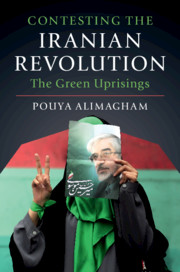Book contents
- Contesting the Iranian Revolution
- Contesting the Iranian Revolution
- Copyright page
- Dedication
- Contents
- Figures
- Preface
- Acknowledgments
- Note on Transliteration
- 1 Situating the 2009 Green Uprising
- 2 From the Theory of Islamic Republicanism to Practice, 1979–2009
- 3 On the Streets and Beyond
- 4 Contesting Palestine
- 5 Mourning as Protest
- 6 Conclusion
- References
- Index
4 - Contesting Palestine
Generating Revolutionary Meaning
Published online by Cambridge University Press: 20 February 2020
- Contesting the Iranian Revolution
- Contesting the Iranian Revolution
- Copyright page
- Dedication
- Contents
- Figures
- Preface
- Acknowledgments
- Note on Transliteration
- 1 Situating the 2009 Green Uprising
- 2 From the Theory of Islamic Republicanism to Practice, 1979–2009
- 3 On the Streets and Beyond
- 4 Contesting Palestine
- 5 Mourning as Protest
- 6 Conclusion
- References
- Index
Summary
This chapter continues the bottom-up approach to history with a focus on a specific day of crowd action, Quds Day. History infuses this day of protest with immense meaning and importance. In the 1970s all revolutionary factions in Iran championed throughout the region were championing Palestinian liberation, and the Islamists institutionalized the emancipation of Palestine as an integral part of the state’s ideology after consolidating power. Freeing Palestine became part of the nation’s visual culture, and the discourse of Palestinian liberation was taught to a generation of Iranian youth raised under the banner of the Islamic Republic. The state even designated the last Friday of Ramadan as Quds Day (Jerusalem Day). Thirty years later, Iranian youth used the occasion of Jerusalem Day to circumvent the security crackdown, re-emerging to protest the election results and the state that had ratified them. They used specific Palestine-centered imagery and slogans to either negate the state, or to legitimate their own uprising and portray the state as the usurper of power akin to Israel. The protest was continued online with specific digital displays of subversion.
Keywords
- Type
- Chapter
- Information
- Contesting the Iranian RevolutionThe Green Uprisings, pp. 137 - 195Publisher: Cambridge University PressPrint publication year: 2020

